- Home
- Christie Golden
On Fire’s Wings Page 21
On Fire’s Wings Read online
Page 21
While the craftsmanship of the flag was admirable, it didn’t even come close to capturing the beauty of the creature as it had appeared to him while he slept. But there it was, complete with a golden chain, which in his dreams had trailed off into shadow.
Now he knew why he had felt such a dreadful sense of impending danger when he had seen the beast. It was the symbol of the unknown Emperor, who seemed poised to descend upon Arukan with all the merciless force of a desert storm.
A name came to him. Ki-lyn. Somehow, he understood that this was the name of the creature. Where had he learned that? Had he heard it in his dream?
Jashemi stared at the ki-lyn, as did all the other men gathered. No, not quite all the other men. Jashemi felt a prickling at the back of his neck that told him he was being watched. Slowly, he lifted his head to see Melaan, Terku’s Second, regarding him with knowing eyes.
Akana, fourth son of the khashim of the Hawk Clan, crouched low over his laboring horse. He gasped for air as the beast did, his heartbeat thudding in his ears, his mind almost numbed with horror at what he had witnessed.
They had come with unbelievable swiftness in the night, pouring down the mountains in staggering numbers. They would not have been seen at all if it were not for a full, revealing moon that exposed them. Still, even with that much of a warning, the outcome was inevitable.
That they were even men was uncertain. The warriors wore metal covering their bodies, metal that clung to them and moved like the flow of a river. They had long, sharp swords that seemed almost too big for a man to wield. Some wore head coverings of metal that completely encased their heads; others let their strange, milky faces and pale hair be seen, causing still more fear. The beasts they rode had no proper tusks, but came in a staggering variety of hues. They, too, wore the flowing metal, and they were completely unafraid of battle.
Arrows did little damage, and the army moved so quickly that soon the Hawk Clan was frantically engaged in hand-to-hand combat. The weapons of scimitar and spear, wielded by men who had not even time to mount their own horses, were of little avail.
The khashim had found his youngest son in the furor and had practically thrown the boy onto a horse.
“Ride!” he had screamed to his son. “Ride and get help, or at least warn the nearest clan!”
“No, Father! I want to fight!”
His father then did something he had never done before; he struck his beloved youngest child across the face. Akana fell at the force of the blow.
“You are the only chance we have!” he bellowed. “Ride, kulis take you!”
And, sobbing, Akana obeyed what he knew was his father’s last wish. There was no time to saddle the beast, only time to leap onto the horse’s back and cling to its increasingly sweat-soaked hide and ride into the desert, ride as if the earth had cracked open and all the kulis in the world were clamoring at his heels.
Akana had no sense of time, no idea how long the horse had been running at a full gallop, but it was slowing now. He screamed at it, he who had never raised his voice above a murmur when talking to animals, and kicked its ribs until he was certain he had left bruises.
He felt a wet warmth on his cheek as the horse blew, and wiped the foam away. The horse’s sides heaved between his legs, and part of him ached for what he was demanding of the creature.
But he saw his brother fall again in his mind’s eye, slashed nearly in two by the impossibly enormous swords. He saw the flood of enemies descending, heard the cries of the women. He didn’t know how he knew, but he was certain that no member of the Hawk Clan would be spared.
Only he would survive. If he survived.
He suddenly, sickly realized that he didn’t even know where the horse was going. He hoped that the mute creature was wiser than he, heading for another settlement instead of out into the open, and deadly, desert.
The horse stumbled. Swearing, Akana kicked it again, but it did not lurch forward. Instead, it let out a low groan and collapsed. Akana was barely able to leap clear as it fell heavily on its side. For a moment, he kicked the horse repeatedly, shrieking incoherently. It cringed from the blows, but did not rise.
Shaking, Akana passed a hand over his face. What was he doing? The beast was exhausted, if not dying. It could go no farther. Gently, he placed a hand on its wet neck, whispered, “I am sorry,” and began to run.
He was slim and strong, and the terror of what he had witnessed gave him extra speed. He settled into a rhythm, arms and legs pumping, sandaled feet flying over the hard, bare rock. Sweat poured forth, cooling him, but his mouth was parched.
He ran until he could run no farther, and then he walked, swaying like a drunken man. Just when he was about to give up and surrender to the earth as the horse had done, he saw it.
A gray tendril of smoke curled up into the moonlit sky. He stumbled into the encampment, of which clan, he did not know. He summoned enough breath to croak a single word, “Warriors!”
They tumbled out of bed with lit torches and weapons, seemingly confused at the sight of an exhausted boy in their midst. A well-dressed man in his middle years approached. No doubt he was this clan’s khashim. Akana stumbled to a stop in front of him, and then to his surprise fell into the man’s arms. He opened his mouth to speak, but nothing came out. His lips and tongue felt thick and leathery.
“Water, quickly,” ordered the khashim. Blessed wetness splashed over Akana’s mouth and he gulped greedily.
“Warriors,” he repeated, “from another land.” He gasped for breath. “They—came in the night and—slew us all.”
“Another land?” the khashim repeated, puzzled.
“He is ill,” came another voice. “Having visions. Dreams.”
“No,” Akana managed to say, struggling in the khashim’s arms. “They have metal on their bodies, and mighty weapons. No clan has such things. They are—”
He fell silent, staring out into the desert. A dark cloud headed straight for the clan’s encampment.
Akana had not warned this clan. He had led the strange warriors directly to them.
The khashim dropped Akana at once, whirling to face the enemy. They descended swiftly, efficiently, but Akana did not see it. He had seen too much this night, and he huddled on the earth in a tight ball, covering his ears and whimpering as horse’s hooves thudded dangerously close. Despite his efforts to block the sounds, he heard the screams and the sickening noise of blades impaling flesh. The stench of blood, urine, and feces assaulted his nose and he uncurled enough to vomit.
It lasted forever. It lasted a heartbeat. Finally, there was a lull in the noise. Akana uncurled, daring to hope that the strange army had departed and he had survived.
He looked up to find one of them standing directly above him, holding a sword a hand’s breadth from Akana’s throat. The warrior said something, but Akana shook his head. Then the warrior grabbed him by the front of his rhia and hauled him to his feet. This, Akana understood, and he shuffled forward, the sword at his back. He was past terror and now felt more curiosity than fear. He expected to be dead. They had left him alive. To what end?
Following the prod of the sword at his back, he was directed toward the corral in which the clan had until now kept their horses. The beasts had been taken by the warriors, and now the corral contained men. Only men; Akana saw no women or children, and shuddered as he realized what must have happened to them. A sharp prick at his back urged him forward into the corral.
The men stared at him with empty eyes. He did not recognize any of them. He had been right; apparently no one else from his clan had survived. Some had blood on their clothing, but all were relatively unharmed. There were three men with swords guarding the others; they wore a mismatched combination of traditional Arukani garb and the metal clothing of the conquerors.
Akana said nothing. More men came into the corral. There was a shout in a language Akana did not understand, and the houses and outbuildings of the clan began to burn. Beside Akana, a man let out a low, guttur
al sound and covered his face.
A tall man clad in metal stepped forward. He removed his head covering. His hair was close-cropped and pale, as was his face; pale as the moon. But even in that light Akana could see the scar that twisted down the man’s face like a snake. The blow had claimed an eye.
The man spoke. He had a thick accent, but the words were clear enough.
“My name is Captain Kayle,” he cried over the crackling of the fire. “I serve the Emperor. You are now his prisoners. You have a choice. If you join the ranks of the Emperor and fight in his name, under his flag, you will be spared. If you refuse, you will be executed immediately. Those who wish to die, step forward, and I will grant that wish.”
At first, no one moved. Then, sobbing, the man standing next to Akana cried, “You murdered my wife and children! I will never fight for you!”
With no weapon save his bare hands, he charged. Kayle, moving easily, readied his massive sword and cut off the man’s head in a single, almost lazy-looking blow.
A horrified murmur rippled through the crowd. A few more sobs broke out.
“Anyone else?” Kayle invited, grinning a little. When no one else stepped forward, he said, “Good. It is not so hard a decision, after all. Now, warriors of the Empire, turn and honor your new standard!”
Numbly, Akana turned with the others and watched as a flag on a pole was brought forward. He stared with listless eyes as the white fabric, easy to see in the moonlight, fluttered in the wind. It looked as though the strange beast, part liah and part dragon, was capering with delight.
Chapter Eighteen
After the meeting, Jashemi wanted nothing more than to return to his tent. He longed to bathe; he knew well the calming properties of cool water lapping at his body. But that was no option here. All he could do was seize some time to himself, and try to reason out the strange, elusive dreams.
He heard a rustle of clothing. Turning, he saw Melaan, and tensed.
“Walk with me,” said Melaan without preamble. They walked together for a while, the sun beating down on their covered heads. Jashemi held his tongue. Melaan had initiated the encounter; Melaan would speak first.
At last, the Second broke the silence. “I watched your face when you saw the creature,” he said.
“We all watched one another’s faces,” Jashemi replied.
“You have seen the standard before.”
“No!” Jashemi whirled on his companion. “I have never seen it—” And then he realized how Melaan had tricked him.
“No,” Melaan said softly. “But you recognized it.”
Jashemi said nothing, then something Raka had said floated back to him. On the defensive with the other man, Jashemi quoted the boy’s words. “‘Be careful with Melaan, Jashemi! His bad dreams sour his temper some days.’”
“My young master has a loose tongue,” Melaan said. “I am fortunate that only you understood what it meant.”
“You have been having strange dreams.”
Melaan nodded. “As, I think, have you.”
Jashemi searched Melaan’s eyes, and then nodded. “Since you were about twelve.” It was a statement, not a question, and again Jashemi nodded. “That’s when they begin. Let me guess what you have been dreaming: of being on a vast expanse of water, with no end in sight, and of a strange Shadow closing in on you. Wiping you out, as easily as this.”
Melaan knelt on the sand and traced a circle with his finger, then with one quick movement erased the image as if it had never been.
“Yes…and no,” Jashemi said. “I do indeed dream of the Shadow approaching. But I am not on a boat; I am on an open area in a great House. Standing next to me is a khashima, who tells me that I must not forget. But I don’t know what it is I’m supposed to remember!”
He slammed a fist into his hand in impotent anger, and yet was keenly aware of relief that he was not the only person who had dreams of the devastating Shadow.
“There are others like us,” said Melaan.
“How do you know? To speak of such things is to condemn yourself as kuli-cursed.”
“But there are hints,” said Melaan. “Hints, like the one you noticed. This is no kuli-curse, Jashemi. This is a warning. Those of us who have these dreams are being given them as a warning to stop the Shadow.”
“I have seen no such Shadow.”
“Not yet,” Melaan admitted. “But we are only now learning of people who live beyond the mountains.”
“You think our dreams and this Emperor are connected?”
“I have seen the ki-lyn in my dreams.”
Jashemi lowered his gaze. “I, too, have seen it. And know its name.”
“I know of other dreamers,” said Melaan. “We must seek them out.”
“We must do more than that,” said Jashemi. He regarded Melaan intently. “We must find a way to unite the clans.”
Melaan snorted. “Compared to that, holding back the Shadow seems like child’s play.”
Holding back the Shadow…there was a way to do that…there were people who could do that….
“We must,” he repeated firmly. “They have a massive army, one that swells with each clan they defeat. Together, we might be able to stand against them. Alone, we will be easy prey, and the clans will be trampled one by one beneath the cloven hooves of the Emperor’s ki-lyn.”
Melaan sighed heavily. “I will speak to Terku,” he said, “and I will do what I can.”
He held out his hand, and Jashemi grasped it. Despite the direness of the situation, he was filled with elation.
He was no longer alone.
Kevla’s misery changed, but did not disappear. It went from an almost unbearable, stabbing agony to a dull, aching throb in her chest. Jashemi’s absence left a gaping hole that nothing could fill, certainly not her mundane and thankless duties in the kitchen.
She still dreamed of the Dragon every night, but there were other dreams: dreams of playing with Jashemi when they were children, dreams of touching him before he left for his first battle, dreams of looking into his deep brown eyes and knowing that she was truly seen.
How did anyone live when a loved one was gone? she wondered. How did her own body continue to function, when all that gave it light and life was so terribly far away?
She refused to think of him lying with another woman. While in her heart she knew she yearned for his physical embrace as much as his presence and voice, that was a longing she had never dared utter. She was Bai-sha, he was a khashim’s son, and he would never be able to take her as wife. She had known of this reality since childhood.
But she was fiercely jealous that this unknown Shali, daughter of a khashim, had Jashemi’s presence. She could talk to him as she wished, without hiding and deception, without fear of repercussions. She could wrap her arms around him, fall into the warm, strong comfort of him. This, Kevla had known, had tasted, and as with honey on the tongue, she wanted more.
The single thing that kept her sane was knowing that now, she was the only person who could protect Tahmu. She and Jashemi knew of Yeshi’s betrayal and Halid’s treason, and Jashemi was many leagues away. He could do nothing. Kevla knew that there was very little even she could do, but at least she was here, at the House. When Tahmu rode to a raid, she begged the Great Dragon every day to send him home safely. She knew, as the other household members could not, that Tahmu was a target not just for rival clans, but for his own Second. It would be easy for Halid to slip into Tahmu’s tent at night, a sharp knife between his teeth….
Pain blossomed in her hand and she bit back a cry. She had become so lost in her thoughts that she had not paid attention while she was chopping vegetables, and had nicked her finger. She stuck it in her mouth and sucked on it, her eyes darting about to make sure no one had noticed her slip, but the kitchen was busy and noisy.
He came home safely, Kevla, she chastised herself as she rinsed her bloody hand until it stopped bleeding. You should be thanking the Dragon, not imagining frightening scenes.
/>
Indeed, that was the reason the kitchen was bustling so. Tahmu had returned, without losing a single man, in the raid against the Sandcattle Clan. Such an event warranted a special feast, and the household was eager to give him one.
Kevla returned to her task and was chopping vegetables with renewed concentration when the kitchen suddenly fell silent. Along with everyone else, she looked up, and her eyes went wide with shock.
Standing in the entrance to the kitchens, her clothing and person both spotless and elegant, was Yeshi. She smiled at Sahlik. The elderly servant hastened to her mistress and bowed.
“Great lady,” said Sahlik, “what do you desire? Some paraah, perhaps?”
All the other servants had stopped what they were doing, but did not dare look directly at the khashima. Kevla, too, bowed her head, but watched Yeshi out of the corner of her eye. She knew her mistress well enough to know that Yeshi rarely visited the kitchens, and in fact had not done so in several years. That was what she had servants for. Why had she not sent them today to fetch her favorite tidbits?
“No, thank you, Sahlik. I just wanted to see and taste for myself how well the feast is progressing.”
Kevla’s eyes widened and her breathing quickened. Something was definitely afoot.
Sahlik clapped her hands. “Return to your duties,” she called, and the servants obeyed. No one dared look at Yeshi except for Sahlik. Kevla continued to chop vegetables, but unlike the others, did not let Yeshi out of her sight.
“What have you prepared?” Yeshi inquired. As Sahlik told her, she nodded, listening. She stepped over to where a girl was carving a decorative bird out of a gourd, removing the fleshy, deliciously sweet fruit with a spoon.
“That looks lovely, child,” Yeshi said, causing the girl to blush and smile. “Tahmu will be pleased. Oh, and is this balaan stew?” She bent over the cauldron and smelled. “Delicious!” she pronounced. “Worthy of such a celebration.”
Kevla clenched her teeth, willing Yeshi not to come to her. She had not looked the woman in the face for years and did not want to do so now. Fortunately, Yeshi seemed to share her sentiment, and brushed past Kevla as if the girl was not there. Kevla caught a faint whiff of scented oils, and for a moment was transported back to when she was eleven years old and massaging the khashima. It seemed like a lifetime ago.

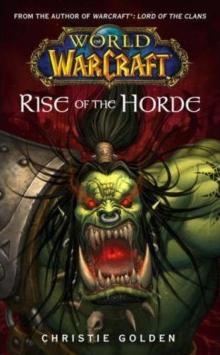 Rise of the Horde
Rise of the Horde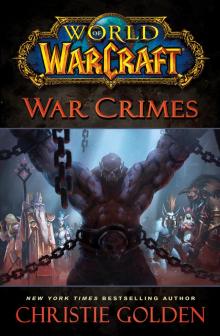 World of Warcraft: War Crimes
World of Warcraft: War Crimes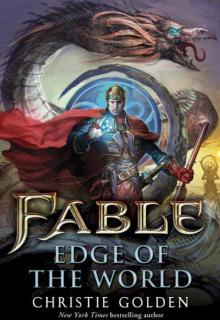 Fable: Edge of the World
Fable: Edge of the World Homecoming
Homecoming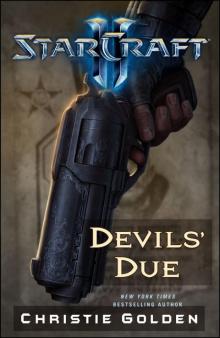 StarCraft II: Devil's Due
StarCraft II: Devil's Due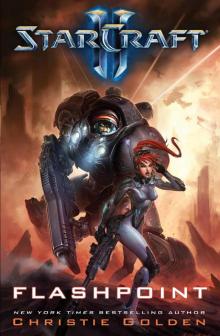 Starcraft II: Flashpoint
Starcraft II: Flashpoint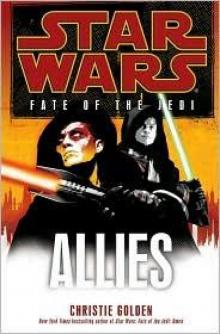 Allies
Allies Shadow Hunters
Shadow Hunters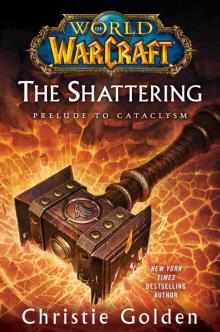 The Shattering: Prelude to Cataclysm wowct-1
The Shattering: Prelude to Cataclysm wowct-1 STAR TREK: VOY - Homecoming, Book Two - The Farther Shore
STAR TREK: VOY - Homecoming, Book Two - The Farther Shore King's Man and Thief
King's Man and Thief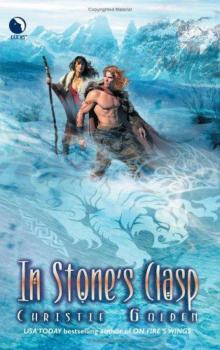 In Stone's Clasp
In Stone's Clasp Jaina Proudmoore: Tides of War
Jaina Proudmoore: Tides of War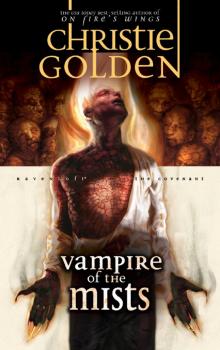 Vampire of the Mists
Vampire of the Mists Star Wars: Fate of the Jedi II: Omen
Star Wars: Fate of the Jedi II: Omen King's man and thief cov-2
King's man and thief cov-2 Star Trek
Star Trek StarCraft: Dark Templar: Twilight
StarCraft: Dark Templar: Twilight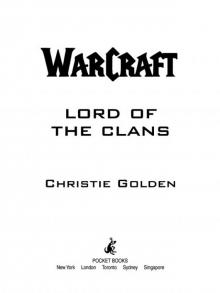 Lord Of The Clans
Lord Of The Clans ARKTIKA.1 (Short Story)
ARKTIKA.1 (Short Story)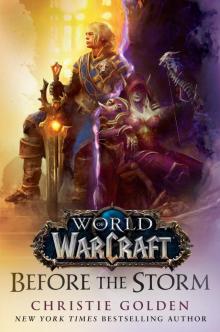 Before the Storm
Before the Storm STAR TREK: VOY - Homecoming, Book One
STAR TREK: VOY - Homecoming, Book One Shadow of Heaven
Shadow of Heaven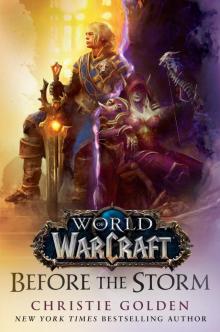 Before the Storm (World of Warcraft)
Before the Storm (World of Warcraft)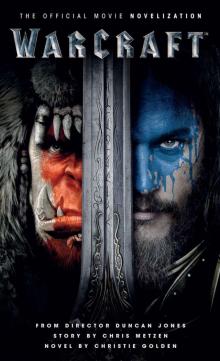 Warcraft Official Movie Novelization
Warcraft Official Movie Novelization Flashpoint
Flashpoint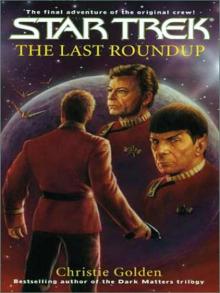 STAR TREK: The Original Series - The Last Roundup
STAR TREK: The Original Series - The Last Roundup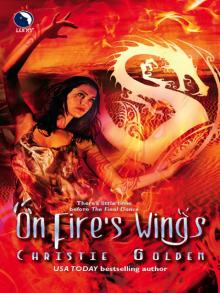 On Fire’s Wings
On Fire’s Wings Spirit Walk, Book One
Spirit Walk, Book One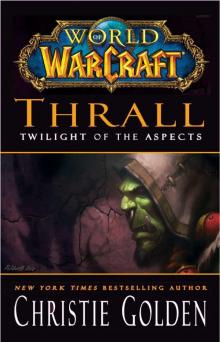 Thrall Twilight of the Aspects
Thrall Twilight of the Aspects Valerian and the City of a Thousand Planets
Valerian and the City of a Thousand Planets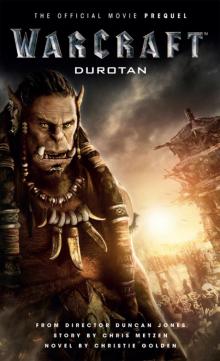 Warcraft
Warcraft Assassin's Creed: Heresy
Assassin's Creed: Heresy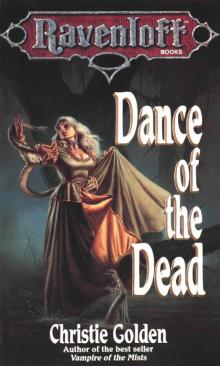 Dance of the Dead
Dance of the Dead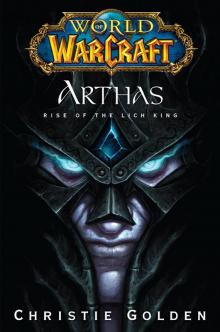 Arthas: Rise of the Lich King wow-6
Arthas: Rise of the Lich King wow-6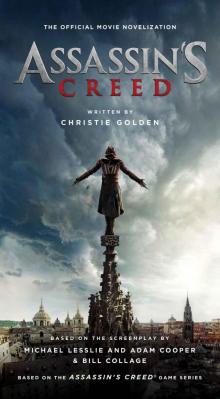 Assassin's Creed: The Official Movie Novelization
Assassin's Creed: The Official Movie Novelization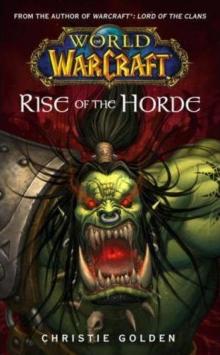 Rise of the Horde wow-2
Rise of the Horde wow-2 Dark Disciple
Dark Disciple Ghost Dance
Ghost Dance The Shattering
The Shattering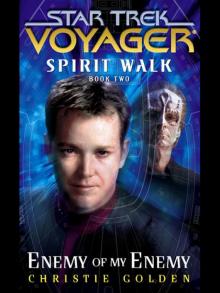 Spirit Walk, Book Two
Spirit Walk, Book Two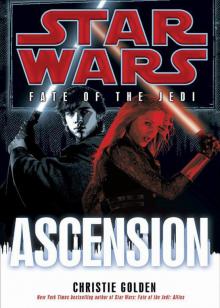 Star Wars: Fate of the Jedi: Ascension
Star Wars: Fate of the Jedi: Ascension Star Wars: Fate of the Jedi V: Allies
Star Wars: Fate of the Jedi V: Allies The Enemy Within
The Enemy Within Kindred Spirits
Kindred Spirits The Farther Shore
The Farther Shore Star Trek: Hard Crash (Star Trek: Starfleet Corps of Engineers Book 3)
Star Trek: Hard Crash (Star Trek: Starfleet Corps of Engineers Book 3) Twilight
Twilight